Initiates a Gas Pressure Car, ITS Spectronics Team Wins Gold
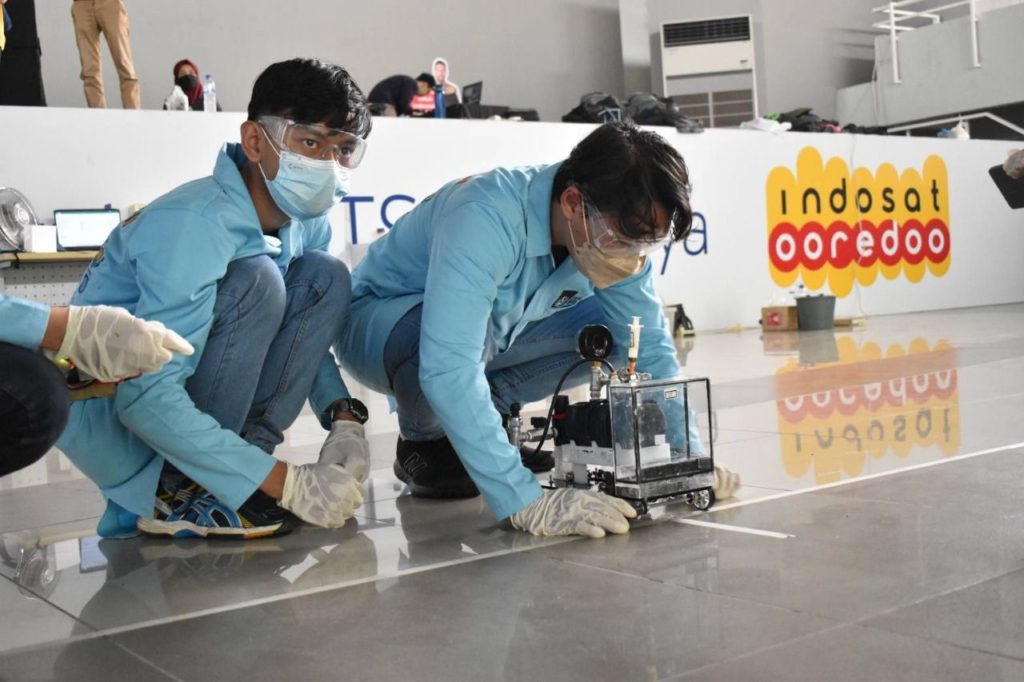
The Chem-E-Car prototype car was designed by the ITS Spektronics team during race day at the Process Engineering and Energy Days University of Indonesia (PGD UI) 2022
ITS Campus, ITS News – As a university that always produces outstanding students, Institut Teknologi Sepuluh Nopember (ITS) continues to add to the long list of awards it has won. This time, the ITS Spektronics team managed to bring home first place in the Process Engineering and Energy Days University of Indonesia (PGD UI) 2022 category of Creation (Chemical-Reaction Car Competition) which lasted for two days, starting last Friday (11/3).
PGD UI is a major annual event organized by the Department of Chemical Engineering UI since 2004, oriented towards solving problems related to energy and the chemical industry. This activity was attended by the ITS Spektronics team led by Lulu Sekar Taji from the Department of Industrial Chemical Engineering as chairman and Fauzan Agra Ibrahim from the Chemical Engineering Department as manager.
Meanwhile, members of the Spektronics team who participated in the match were Bernardus Krisna Brata, Abdul Quddus Al Kahfi, and Muhammad Rafli Revansyah from the Chemical Engineering Department, and Wahyu Febianto from the Electrical Engineering Department. The six students have been preparing for the competition for six months since the registration in September 2021.
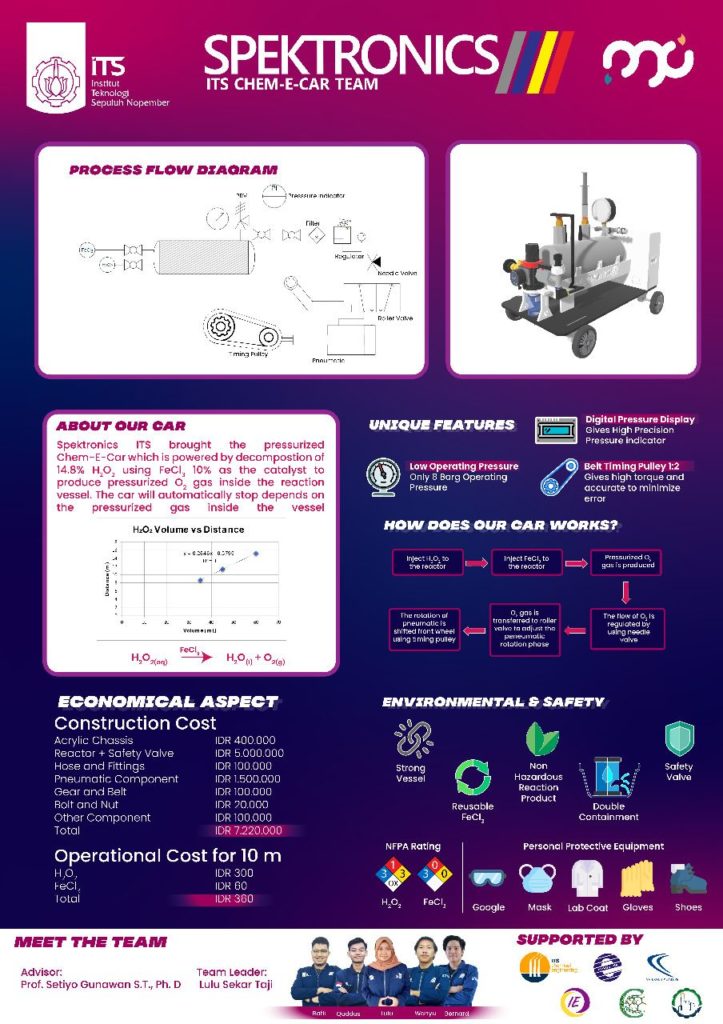
Poster of the Chem-E-Car prototype car designed by the ITS Spektronics team
In the explanation given, according to Lulu, the ITS Spektronics team created a prototype of a car fueled by chemical reactions called the Chemical Engineering Car (Chem-E-Car). Cars fueled by chemical reactions are car models that use the products of chemical reactions as propulsion.
In this competition, Lulu said that the prototype made by the ITS Spektronics team relied on gas pressure as the power to move the car forward. “We make a car based on a chemical reaction in the form of pressure, the source of which is gas pressure from the reaction of Hydrogen Peroxide and Ferric Chloride,” said the student who was born in June 2000.
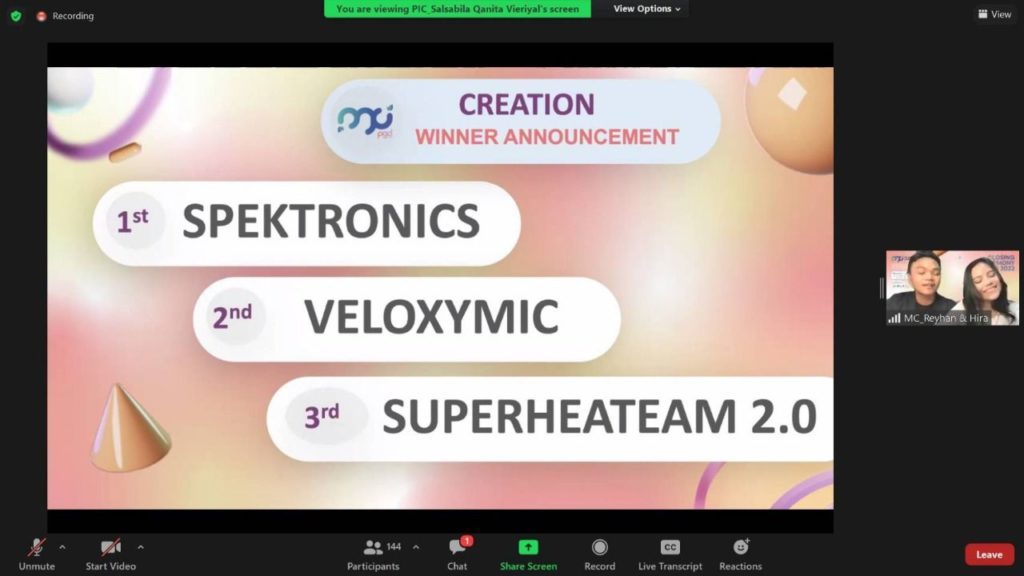
Announcement of the winner by PGD UI 2022 to the Spektronics ITS team conducted online
The innovation succeeded in bringing the ITS Spektronics team to become the first winner in the race day which was the culmination of a series of PGD UI 2022 activities. Lulu said that the challenges posed in this competition were in the form of accuracy and precision in car mileage, where the participants’ assembled cars had to walk as far as possible. 9.5 meters and stops at the right point while lifting a mass of 200 mL water.
The working process on the Chem-E-Car was carried out from the design stage to assembly and took two weeks. Based on the information from the girl who was born in Surabaya, the advantage of the car which is made using acrylic material lies in its precision. “On the day of the match, our team got the smallest error, which was 3 centimeters from the set target, so the distance that was successfully covered was 9.53 meters using a water load,” he explained.
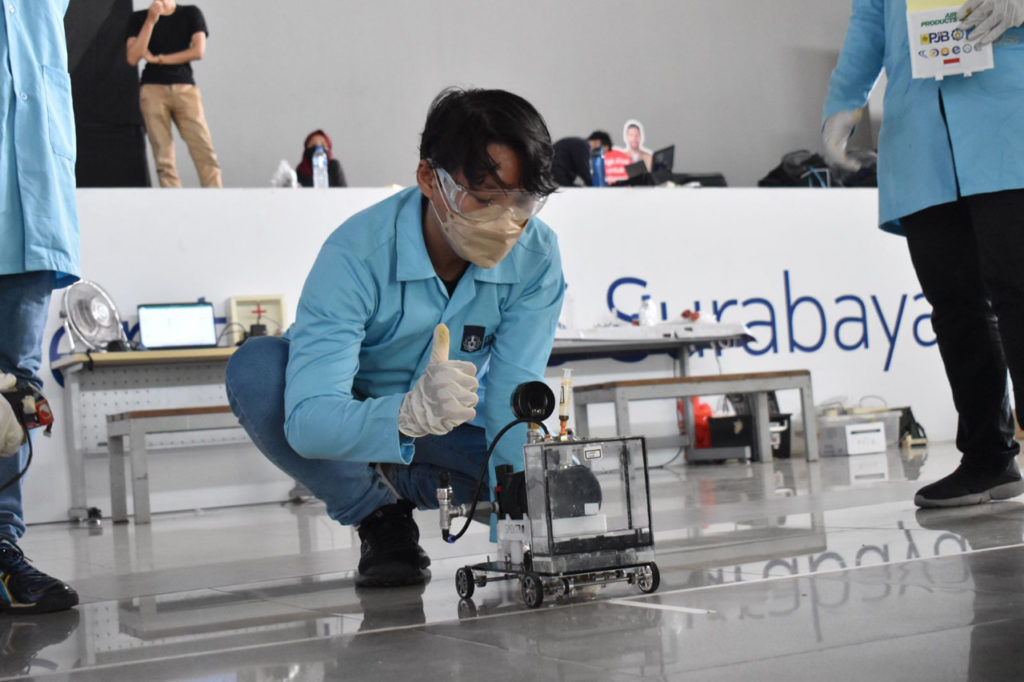
The ITS Spektronics Team when preparing to test the speed of the prototype car in the Chem-E-Car competition at the Process Engineering and Energy Days University of Indonesia 2022
Lulu also gave an overview of how the Chem-E-Car works, in which the prototype uses Hydrogen Peroxide and Ferric Chloride compounds which then react to produce oxygen. Next, oxygen is supplied to the transducer and the air pressure is read digitally. Oxygen undergoes a filtering process to release the remaining liquids from the reaction to produce pure oxygen.
Furthermore, Lulu explained, the filtered oxygen was also set at a pressure of 0.2 bar. Gas movement is also regulated through a device called an air filter regulator and sent to a pneumatic system (a motion system that utilizes air). “This constant flow of gas then enters the pneumatic system which is used to propel the car so that it can move,” Lulu explained again.
To find out how far the car can move, the student who was once an assistant to Industrial Biotechnology Laboratory added that the Spektronics team calculated the distance traveled by the car and the point where the car could stop. This calculation also uses the help of a tool called a timing belt pulley to minimize errors, so that the movement of the car becomes more accurate and the car will stop when the gas pushing it has run out.
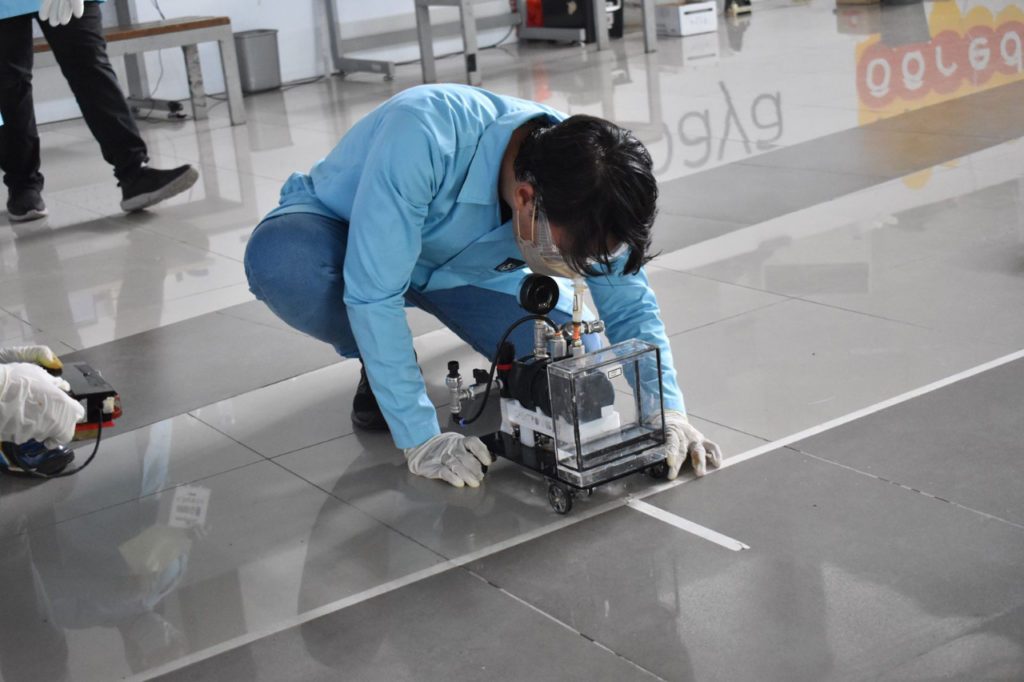
The ITS Spektronics team checks the pressure of oxygen gas as the driving force for the Chem-E-Car prototype car designed before competing in the Process Engineering and Energy Days UI 2022
In the process, Lulu said that the biggest obstacle for the Spektronics team was during the data calculation process due to the Covid-19 pandemic. It forced them to keep their distance, hence they couldn’t communicate at a close distance. “We are making adjustments in this condition by complying with the health protocols set by the government and implementing social restrictions,” he said.
For this achievement, the Spektronics team also expressed their gratitude to PT Energi Quarto Indonesia, the ITS Chemical Engineering Alumni Association (ALTEKIMITS), and Tridiku. Lulu hopes that the Spektronics team will still maintain their championship title, especially in the Chem-E-Car field on a national and international scale. “Hopefully ITS students can make ITS great in all fields and be a good example for other universities in Indonesia,” concluded Lulu. (ITS Public Relations)

The prototype car made by the ITS Spektronics team in PGD UI 2022
Reporter: Yanwa Evia Java
Related News
-
ITS Wins 2024 Project Implementation Award for Commitment to Gender Implementation
ITS Campus, ITS News —Not only technology-oriented, Institut Teknologi Sepuluh Nopember (ITS) also show its commitment to support gender
March 16, 2022 19:03 -
ITS Professor Researched the Role of Human Integration in Sustainable Architecture
ITS Campus, ITS News –The developing era has an impact on many aspects of life, including in the field
March 16, 2022 19:03 -
ITS Sends Off Group for Joint Homecoming to 64 Destination Areas
ITS Campus, ITS News — Approaching Eid al-Fitr, the Sepuluh Nopember Institute of Technology (ITS) is once again facilitating academics who want
March 16, 2022 19:03 -
ITS Expert: IHSG Decline Has Significant Impact on Indonesian Economy
ITS Campus, ITS News — The decline in the Composite Stock Price Index (IHSG) by five percent on March 18,
March 16, 2022 19:03
